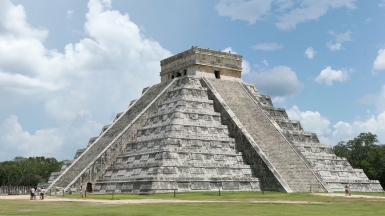
A new discovery provides insight into what caused the Mayan civilisation to collapse 1,000 years ago.
Some scientists believe that a severe drought caused the ancient power to dry up, and a Rice University researcher demonstrated just how powerful such an event could have been.
Dr André Droxler examined sediment in the Great Blue Hole to discover the type of minerals present during the Mayans' time. The hole is an ancient, 1,000-foot crater about 40 miles off the coast of Belize.
Droxler discovered that between 800 AD and 1000 AD, when the Mayan civilisation ended, there were only one or two tropical cyclones every 20 years, as opposed to the five or six that are more common today. The severe storms would have been a necessary source of nourishment for the ancient civilisation.
When researchers studied the sediment in the Great Blue Hole, they found that there was a low ratio of titanium to aluminum. This is indicative of low rainfall, as rain causes titanium from volcanic rocks to wash into sediment. Those mineral deposits flow into the Atlantic Ocean, and into the Great Blue Hole.
"[It's]like a big bucket," Droxler told LiveScience of the giant crater. "It's a sediment trap."
The scientist's discovery supports research published in 2012 by the Science journal. Analysis of a 2,000-year-old stalagmite from a Belizean cave "found that sharp decreases in rainfall coincided with periods of decline in the culture," according to Discovery.
The research suggests that the Mayans may have starved to death due to drought. The ancient civilisation existed in what is now Guatemala, and had expansive fortresses and pyramids, an agricultural system, and a rich society. The Mayans used mathematics, hieroglyphics, and art, and has continued to be a source of intrigue and discovery generation after generation. Their civilisation ended around 900 AD.













